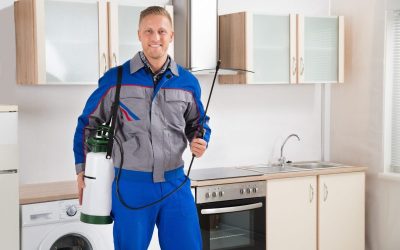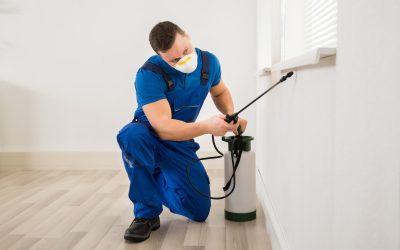Rodent infestations are a common problem for homeowners, especially as the weather turns colder and these creatures seek shelter. While a rodent sighting in your home can be unsettling, there are steps you can take to handle the situation safely and effectively.
Why Rodent Infestations Are a Serious Concern
Rodents, including rats, mice, and squirrels, are more than just a nuisance. They pose significant risks to your home and health. Here are some reasons why dealing with a rodent infestation promptly is essential:
1. Health Hazards
Rodents can carry a variety of diseases, some of which are transmitted through their urine, feces, or saliva. Diseases such as leptospirosis, hantavirus, and Salmonella are commonly spread by rodents. These diseases can cause serious health issues for you and your family if not handled appropriately. Additionally, rodents are known to trigger allergies and asthma attacks, especially in young children and those with respiratory sensitivities.
2. Property Damage
Rodents often chew on wiring, insulation, and wood, leading to expensive property damage. They can also cause damage to personal belongings and furniture by nesting in them. The longer an infestation is left unchecked, the more damage these creatures can inflict on your home.
3. Contamination of Food
Rodents are notorious for contaminating food supplies in your pantry. Even if they don’t eat your food directly, they can spread harmful bacteria by walking on food packaging, leaving urine or droppings behind.
Given these risks, it’s critical to act quickly when you suspect a rodent infestation. Below are some important steps to handle the problem effectively.
How to Safely Handle a Rodent Infestation
1. Identify the Signs of an Infestation
Before you can address a rodent infestation, it’s essential to confirm that one exists. Common signs of rodent activity include:
- Droppings: Rodent droppings are typically found near food sources or in places where rodents are likely to nest, such as attics or basements.
- Gnaw Marks: Rodents tend to chew on wires, wood, or food containers to keep their teeth trimmed. Look for gnaw marks on baseboards, furniture, or exposed wiring.
- Footprints or Trails: Rodents often leave behind grease marks or footprints along areas they frequently travel, such as walls or beams.
- Nesting Materials: Rodents will often gather insulation, fabric, or paper to build nests. These are typically found in secluded areas like behind appliances or inside walls.
If you notice any of these signs, it’s time to act.
2. Seal Entry Points
Rodents can squeeze through the smallest cracks and holes, so sealing entry points is crucial. Inspect your home for any potential gaps, especially around windows, doors, pipes, and vents. Use steel wool, caulking, or hardware cloth to close these openings. It’s important to ensure that all vents and chimneys are properly screened to prevent rodents from entering.
3. Set Traps and Baits
If you’re dealing with a mild infestation, traps and baits can be an effective way to catch and remove rodents. Place traps along walls, in dark corners, and near entry points where rodents are most active. If you’re using bait stations, ensure they are placed out of reach of pets and children to avoid accidental poisoning.
While traps can be useful in controlling a small infestation, they are not always sufficient in completely eliminating a rodent problem. A professional pest control service can assess the situation and implement more targeted treatments.
4. Maintain Cleanliness and Remove Food Sources
Rodents are attracted to food sources, so keeping your home clean is essential in preventing infestations. Store food in airtight containers, clean up crumbs and spills immediately, and take out the trash regularly. Ensure pet food is also stored properly, and avoid leaving it out overnight.
In addition, be mindful of any outdoor food sources, such as bird feeders or compost piles, which can also attract rodents. By eliminating food sources, you make your home less appealing to rodents, making it more difficult for them to thrive.
5. Call a Trusted Pest Control Service Provider
If you’ve tried the above steps but still have a rodent problem, it’s time to call in the professionals. A trusted pest control service provider can evaluate the situation, offer targeted treatments, and help prevent future infestations. Pest control experts have the tools and expertise to safely and effectively remove rodents from your home.
Professional pest removal services also provide long-term solutions by identifying and addressing the root causes of infestations. Whether it’s sealing entry points, using advanced traps, or providing ongoing maintenance, professional pest control ensures that your home remains rodent-free.
If you’re looking for expert help with a rodent infestation, Grizzly Pest Control is a trusted pest control service provider that offers comprehensive pest removal solutions.
Why Professional Pest Control Services Are the Best Solution
Handling a rodent infestation can be overwhelming, especially when the problem is widespread. While you can take steps to control the issue yourself, professional pest control services are often the most effective and safest option. Here’s why:
- Expert Knowledge: Pest control specialists have a deep understanding of rodent behavior and the best methods for removal.
- Safe Solutions: Professional pest control companies use safe and effective treatments that protect your family, pets, and the environment.
- Long-Term Prevention: Pest control services don’t just eliminate rodents; they also offer solutions to prevent future infestations, including sealing entry points and offering ongoing monitoring.
By partnering with a professional pest control service, you ensure that your rodent problem is dealt with quickly and thoroughly.


